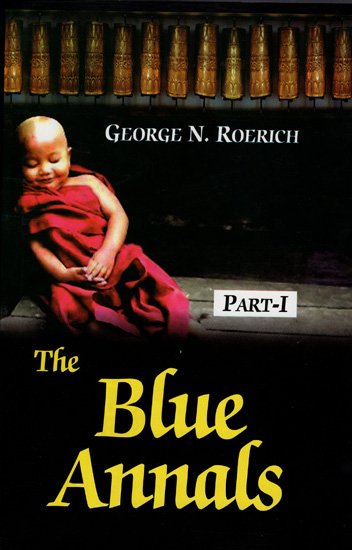Blue Annals (deb-ther sngon-po)
by George N. Roerich | 1949 | 382,646 words | ISBN-10: 8120804716 | ISBN-13: 9788120804715
This page relates ‘Shong ston rdo rje rgyal mtshan’ of the Blue Annals (deb-ther sngon-po)—An important historical book from the 15th century dealing with Tibetan Buddhism and details the spiritual doctrine and lineages of religious teachers in Tibet. This chapter belongs to Book 10 (The Kalacakra).
Chapter 21 - Shong ston rdo rje rgyal mtshan
Shong ston rdo rje rgyal mtshan, born at bong ra of spyad lungs shar kha, studied under stag sde ba numerous śāstras, such as Logic (Pramāṇa), etc. Having copied about forty pages of the Kālacakra, he presented them as remuneration, and thus obtained the complete initiation into the Kālacakra. He also listened to the exposition of the Tantra and its Commentary (Vimalaprabhā), based on the translation of ‘bro (lo tsā ba). He studied under gro lung pa mdo sde rgyal mtshan many Tantric treatises (sāstras) and astrology.
When the bla ma 'phags pa returned to Tibet, he presented him with a well composed śloka of praise. Having said that he intended going to study the work of a translator, he begged 'phags pa to send him on (to India), and the latter said: It is a good idea! But it is difficult to acquire the ability of translating new texts. Study well and interrogate paṇḍitas. Because of the shortness of my study with the Dharmasvàmin, I do not know properly the sdebs sbyor me tog gi chung po[1] composed by the Lord himself (sa skya pan chen), the tshig gi gter,[2] and other texts. Therefore you should at any rate master them! saying so, he gave him the above mentioned books, five golden srangs, and ten pieces of silk. Having reached Nepāl, he attended for five years on the paṇḍita
Mahendrabhadra and mastered the five lesser sciences.[3] He especially studied the science of grammar. Then he proceeded to sa skya, and prepared a good translation of the Śrī-Kālacakra-Tantra together with its commentary (Vimalaprabhā). This (translation) was seen by the Precious 'phags pa who sent him a letter praising him because he possessed better faculties than the lo tsā bas who had previously translated the Kālacakra-Tantra.
Shong (ston) translated for the first time the dpag bsam 'khri shing,[4] as well as corrected some other translations. He also introduced the study of Sanskrit grammar, prosody, and lexicology (in
Tibet). He taught the work of a translator to his own younger brother shong blo gros brtan pa, and preached the Kālacakra-Tantra and its Commentary. Blo brtan preached it to sgra tshad pa rin chen rgyal mtshan and to the lo tsā ba mchog ldan. 'jam dbyangs skyi ston obtained it from the latter, and kun mkhyen chen po (shes rab rgyal mtshan) obtained it from him.
Further, the bla ma dpal Idan seng ge ba, known to have been learned in the "Seven Treatises on Logic" (tshad ma sde bdun) which he had studied under the lo tsā ba mchog Idan, obtained them (the Kālacakra-Tantra and the Vimalaprabhā) in the translation of shong. He also obtained the translation by rwa from rong pa shes rab seng ge. Kun spangs chos grags dpal bzang po obtained from him the complete exposition (of the system) according to the initiation rite and translation by shong.
Again, kun mkhyen 'dzims pa obtained (the Kālacakra) from mngon gra ba rin chen rtse mo. From him and from the bla ma rgwa lo the complete methods of ‘bro and rwa were obtained by the monk tshul khrims 'bar, a native of dbus. Dus 'khor ba ye shes rin chen obtained it from the latter. Kun mkhyen yon tan rgya mtsho obtained it from him. Again, the Lord of Scholars (mkhas pa'i dbang po) dpang blo gros brtan pa obtained it from stag sde ba.[5]
Footnotes and references:
[1]:
A treatise on prosody.
[2]:
name of a grammatical work by sa skya pan chen
[3]:
mngon brjod, snyan ngag, sdebs sbyor, zlos gar, and rtsis.
[4]:
Bodhisattvāvadānakalpalatā, Tg. Skyes rabs, No. 4155.
[5]:
dpang blo gros brtan pa, and his brother shong ston rdo rje rgyal mtshan are considered to have been the founders of philological studies in Tibet /rig gnas includes grammar, prosody, etc./
